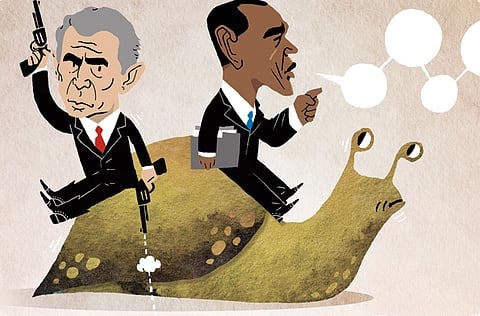Caught between war and diplomacy
Nato’s deterrence will be credible only if governments restore its legitimacy in the eyes of voters who have grown deeply cynical

Former US president George W Bush’s response to unbiddable adversaries was to bomb them; and, if they did not listen, to bomb them again. President Barack Obama has decided the US should talk to its enemies; and, if they do not listen, well, it should talk to them again.
Some will find these characterisations unfair. To a degree they would have a point. But only to a degree. If Bush tested to destruction the notion that war-war was the way to set the world to rights, Obama should have learnt that jaw-jaw has its own limitations. Albeit in very different ways, the two leaders have presided over a significant diminution of US power.
It is much easier to side with Obama’s faith in diplomacy. After the bloody havoc wrought by the likes of Bush’s sidekicks, Dick Cheney and Donald Rumsfeld, the US badly needed a president ready to recognise the realities of a more multipolar world and to give diplomacy a go.
Afghanistan and Iraq stand as painful testimony to the damage that can be wrought by wars of choice. These costly defeats have encouraged Americans to turn inwards and disclaim any responsibility to uphold a rules-based international order. The US may yet turn its back on the world, as it did during the 1920s and 1930s.
On the other side of the Atlantic, Bush’s wars reinforced Europeans in the naive conviction that conciliation and concession are always better than anything that would run a risk of conflict. This state of mind has its own echoes in the appeasement policies of the interwar years.
Syria and, more recently, Russia’s annexation of Crimea and its efforts to turn the rest of Ukraine into a failed state, testify to what can happen when a US administration goes too far in prizing restraint over resolve. I have always thought talk of inexorable American decline to be vastly overdone. What is true is that Obama’s foreign policy has seen global perceptions of waning US power running far ahead of economic and military realities.
These perceptions matter. They shape the behaviour of others. I spent the early part of last week at the annual forum of South Korea’s Asan Institute in Seoul. This gathering of foreign-policy experts saw plenty of lively argument about who to blame for an upsurge of nationalism and rising tensions in the East and South China seas. On one thing they all agreed: Obama, on a four-nation tour of the region, will struggle to revive Washington’s standing among its allies.
Putin’s march into Ukraine had two rationales. The first, a consequence of Moscow’s failure to coerce Kiev into a Eurasian union, was rooted in the 19th-century concept that Russian security depends on command of its near-abroad. The second was a calculation that European disunity and Obama’s aversion to confrontation would blunt the international response.
No one should quarrel with the White House for sending John Kerry, the US Secretary of State, for successive rounds of talks with his Russian counterpart, Sergei Lavrov. Diplomacy, though, does not work in a vacuum. What has been missing has been a persuasive signal of US readiness to impose serious costs on Moscow.
I am not suggesting that the US and its European allies should be reaching for their guns. But Washington could have assembled (and should still do so) a much stronger set of economic measures, including financial sanctions, as a demonstration of its determination to defend basic international norms of behaviour.
Of course, some Europeans would grumble. My guess, though, is that many would secretly cheer a US plan that forced them to look seriously at their energy dependence on Moscow and to overrule the European businesses that insist international law comes second to corporate profits. The alternative, after all, is for Europe to abandon all pretensions of co-operative internationalism and embrace a return to the days when the continent’s borders depended on the balance of force.
Obama and his fellow Nato leaders are due this summer to map out a new course, following the alliance’s withdrawal from Afghanistan. Some think that Putin has done the job for them. The organisation, they suggest, can pick up where it left off and revert to its old role as the guardian of Europe’s defence.
The truth is that governments have a much bigger task. Dispatching a few more troops to Poland and the Baltics will be pointless if the alliance does not remake the political case for collective defence. Nato’s mission is to avoid wars by serving as a credible deterrent. But the deterrence will be credible only if governments restore its legitimacy in the eyes of voters who have grown deeply cynical about the efficacy of defence spending.
Ukraine should have been a wake-up call for Europeans about the returning threat to the security and freedom they have come to take for granted. The opinion polls suggest it has been otherwise.
War — cold or hot — against Russia is not an answer. Nor, though, is an assumption that jaw-jaw can do the job. A tough rejoinder to Putin should sit alongside an approach that offers genuine partnership to a Russia that plays by the rules. Much depends on Obama.
I heard many times in Seoul that east Asia needs a strong US. So, though it hates to admit it, does Europe.
—Financial Times
Sign up for the Daily Briefing
Get the latest news and updates straight to your inbox



